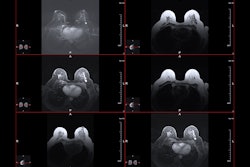A study led by Springbok Analytics scientists suggests a new MRI machine learning-based model can predict disease progression in patients with facioscapulohumeral muscular dystrophy (FSHD).
This study introduces a multiscale machine-learning framework leveraging whole-body MRI and clinical data to predict regional, muscle, joint, and functional progression in FSHD.
“Traditional functional metrics are simply not the best way to measure disease given the complexity and heterogeneity of FSHD,” said Silvia Blemker, PhD, lead author and chief scientific officer and co-founder of Springbok, in a news release. "What we've shown in this study is that muscle MRI, combined with advanced machine learning, can capture that complexity and make it actionable, supporting more sensitive, predictive, and patient-specific trial designs."
FSHD is a progressive, genetic neuromuscular disorder affecting approximately one in 7,500 individuals. It is driven by the aberrant expression of the DUX4 protein, which leads to skeletal muscle wasting and functional decline.
The study was published July 16 in Scientific Reports.




















